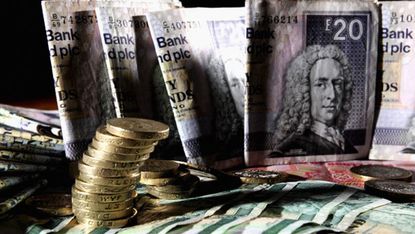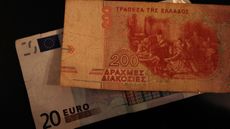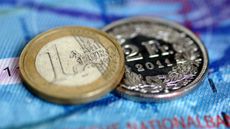What currency should an independent Scotland adopt?
If Scotland does vote for independence it must decide the future of its currency

IN THE event of a 'Yes' vote in Scotland's referendum, and the establishment of independence, what currency should the country adopt? Various suggestions from keeping the pound to setting up a brand new currency have been put forward.
As Chancellor George Osbone nails his colours to the mast, here are the options:
Sterling – formal currency union
Subscribe to The Week
Escape your echo chamber. Get the facts behind the news, plus analysis from multiple perspectives.

Sign up for The Week's Free Newsletters
From our morning news briefing to a weekly Good News Newsletter, get the best of The Week delivered directly to your inbox.
From our morning news briefing to a weekly Good News Newsletter, get the best of The Week delivered directly to your inbox.
Alex Salmond favours a formal currency union with the UK, according to a White Paper by the Scottish government. The paper sets out the case for Scotland maintaining a formal currency union with the rest of the UK in the event of independence, the BBC reports.
But UK Chancellor, George Osborne, this week said that a vote for Scottish independence would mean the end of a unified currency. Speaking in Edinburgh, the chancellor said: "The pound isn't an asset to be divided up between two countries after a break-up like a CD collection. If Scotland walks away from the UK, it walks away from the UK pound."
The rest of the UK's economy dwarfs that of Scotland by a factor of ten, leading some analysts to suggest that any attempts to create a union would necessarily not be a relationship of equals. While the advantages to Scotland of a unified "sterling-zone" are obvious, the UK government's indications that it intends to play hardball have made Salmon go in search of a "Plan B," the Scotsman reports.
Sterling – informal currency union
An informal currency union would see Scotland continue to use the pound but without the permission of the UK. This would be similar to the relationship Panama has with the US dollar.
"This model, however, is seen by economists as problematic because, without a link to a central bank, an independent Scotland would have no safety net when financial crises strike," The Scotsman says.
In such an arrangement the Bank of England would also have no obligation to intervene in the event of trouble.
Scotland's own currency – fixed
One obvious option would be to create an entirely new currency linked to the pound in the same way the Irish punt used to be fixed to sterling. This is a model that has worked well for Denmark, the Scotsman notes: "The Danish krone is pegged to the euro at around 7.45, an arrangement which has offered remarkable stability over the past decade or so."
In such a model, a Scottish central bank would have no control over interest rates, but in the case of financial crisis it would allow Scotland some flexibility to adjust its currency if it needed to do so.
Many independence supporters think this may be the best option, providing the right combination of security and autonomy.
Scotland's own currency – floating
This option would see the creation of a new currency entirely disconnected from any other currency. This is a system that tends to be adopted by currencies based on strong economies, such as the US dollar, Swiss franc of British pound. A country around the same size as Scotland that has adopted this model is Norway, whose currency has a propensity for volatility, fluctuating from a high of 9.95 against the euro to a low of 8.00 in the last ten years. One potential positive of a floating currency is that it would allow Scotland to control its own interest rates, but many believe the threat of volatility makes this model too great a risk.
Euro – informal currency union
Adopting an informal union with the euro would see Scotland create the same relationship with Europe as Montenegro, which has adopted the euro without being a member of the eurozone.
Under this model, the European Central Bank would be under no obligation to assist Scotland if it ran into financial trouble. It would therefore be more likely that Scotland would pursue a more formal union with the euro.
Euro – formal currency union
This model would be similar to union with the pound, except that it would mean the country would have interest rates set by the European Central Bank, rather than the Bank of England.
As well as the costs associated with changing from pounds to euros, there would be the added risk of joining up with the Eurozone in a time of instability.
"There is the danger that policy set by the European Central Bank would be less suited to the Scottish economy than that set by the Bank of England. Joining the euro, however, would see Scotland constrained by the European Union's fiscal framework and the banking union that is currently being developed in order to try to bring more stability across the eurozone," The Scotsman says.
Create an account with the same email registered to your subscription to unlock access.
Sign up for Today's Best Articles in your inbox
A free daily email with the biggest news stories of the day – and the best features from TheWeek.com
-
 Quiz of The Week: 20 - 26 April
Quiz of The Week: 20 - 26 AprilPuzzles and Quizzes Have you been paying attention to The Week's news?
By Rebecca Messina, The Week UK Published
-
 Humza Yousaf clears the decks to battle no-confidence vote
Humza Yousaf clears the decks to battle no-confidence voteSpeed Read First minister is 'done', according to insider, but a single vote could change the balance
By Arion McNicoll, The Week UK Published
-
 Immunotherapy and hay fever
Immunotherapy and hay feverThe Explainer Research shows that the treatment could provide significant relief from symptoms for many hay fever sufferers
By Richard Windsor, The Week UK Published
-
 How would Italy’s ‘parallel currency’ work?
How would Italy’s ‘parallel currency’ work?Speed Read Deputy prime minister hints at nuclear fiscal option in defiant riposte to EU ultimatum
By The Week Staff Last updated
-
 US stock markets fall after Greek vote
US stock markets fall after Greek voteSpeed Read Wall Street slide mirrors falls in Asia and Europe as global 'Grexit' jitters take hold
By The Week Staff Published
-
 Greek crisis: a case of history repeating itself
Greek crisis: a case of history repeating itselfIn Depth If Greece leaves the euro, it won't be the first monetary exit for the Hellenic Republic
By The Week Staff Published
-
 Greece crisis: has bailout ended threat of Grexit?
Greece crisis: has bailout ended threat of Grexit?In Depth Economic targets remain ambitious and the political situation is far from settled
By The Week Staff Last updated
-
 Swiss franc soars after chaotic end to euro cap
Swiss franc soars after chaotic end to euro capIn Depth Why market turmoil followed decision to lift system pegging value of Swiss franc to the euro
By The Week Staff Last updated
-
 'Bleak milestone' as eurozone unemployment hits 12%
'Bleak milestone' as eurozone unemployment hits 12%In Depth Euro falls as predictions of recovery confounded by record joblessness in first two months of year
By The Week Staff Published